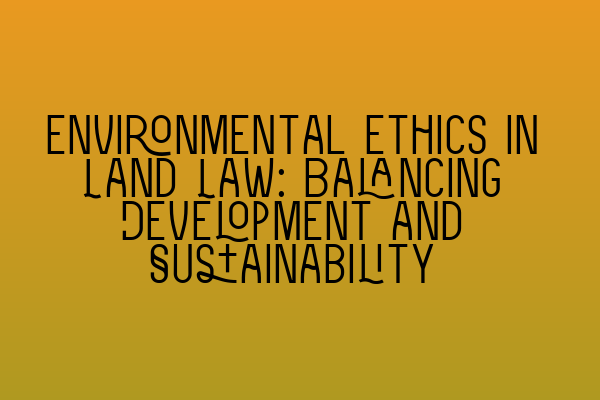Environmental Ethics in Land Law: Balancing Development and Sustainability
In the pursuit of progress and economic growth, it is crucial to recognize the importance of upholding environmental ethics within the realm of land law. As an essential component of sustainable development, environmental ethics plays a pivotal role in ensuring that we strike a balance between development and the preservation of our natural resources. Today, we will explore the intricate relationship between land law and environmental ethics, and shed light on the measures that can be taken to promote sustainable practices.
Land law governs the rights and responsibilities associated with the ownership, use, and transfer of land. It provides a framework that regulates property transactions and ensures fair allocation of resources. However, the rapid pace of urbanization and industrialization has led to considerable strain on our environment. This has necessitated the integration of environmental ethics into land law, in order to safeguard the interests of present and future generations.
One of the key considerations in land law with respect to environmental ethics is the concept of sustainable development. Sustainable development seeks to meet the needs of the present generation without compromising the ability of future generations to meet their own needs. It emphasizes the importance of balancing economic growth with social and environmental well-being.
A crucial aspect of sustainable development in land law is the preservation of natural resources. Our land is home to a wide array of ecosystems, flora, and fauna, all of which contribute to the delicate balance of our environment. Promoting sustainable land use practices through land law ensures the preservation of these resources for the benefit of current and future generations.
With the incorporation of environmental ethics into land law, there are several measures that can be implemented to strike a balance between development and sustainability. These include:
1. Environmental Impact Assessments (EIAs): These assessments evaluate the potential environmental consequences of a proposed development project. By conducting thorough EIAs, land law can effectively assess the environmental implications of a project before granting permissions, thus minimizing negative impacts.
2. Zoning and Land Use Planning: Land law can designate specific areas for different uses, such as residential, commercial, or industrial. Proper zoning and land use planning can ensure that development is carried out in a controlled manner, minimizing environmental harm and promoting sustainable practices.
3. Conservation and Protected Areas: Land law can establish protected areas and conservation zones, which serve as safeguards for critical habitats and species. By designating these areas, land law ensures that they remain untouched by development, preserving the ecological balance.
4. Incentives for Sustainable Development: Land law can provide incentives for sustainable development practices, such as tax breaks or grants. By offering rewards for environmentally-friendly initiatives, land law encourages individuals and businesses to adopt sustainable practices.
5. Land Remediation and Environmental Cleanup: Land law can establish mechanisms for the remediation of contaminated lands and the cleanup of polluted areas. By holding polluters accountable and imposing penalties, land law promotes environmental responsibility and protects our natural resources.
By integrating environmental ethics into land law, we can establish a legal framework that prioritizes sustainable development. This not only ensures the long-term health and well-being of our environment but also fosters economic growth that is built on the principles of environmental responsibility.
In conclusion, environmental ethics play a vital role in land law by striking a balance between development and sustainability. Sustainable development, preservation of natural resources, and responsible land use are pivotal for the well-being of our environment and future generations. By incorporating environmental ethics into land law, we can create a legal framework that promotes sustainable practices, thereby safeguarding the future of our planet. Let us strive towards a future where development and sustainability go hand in hand, shaping a world that thrives while preserving the beauty and integrity of our environment.
